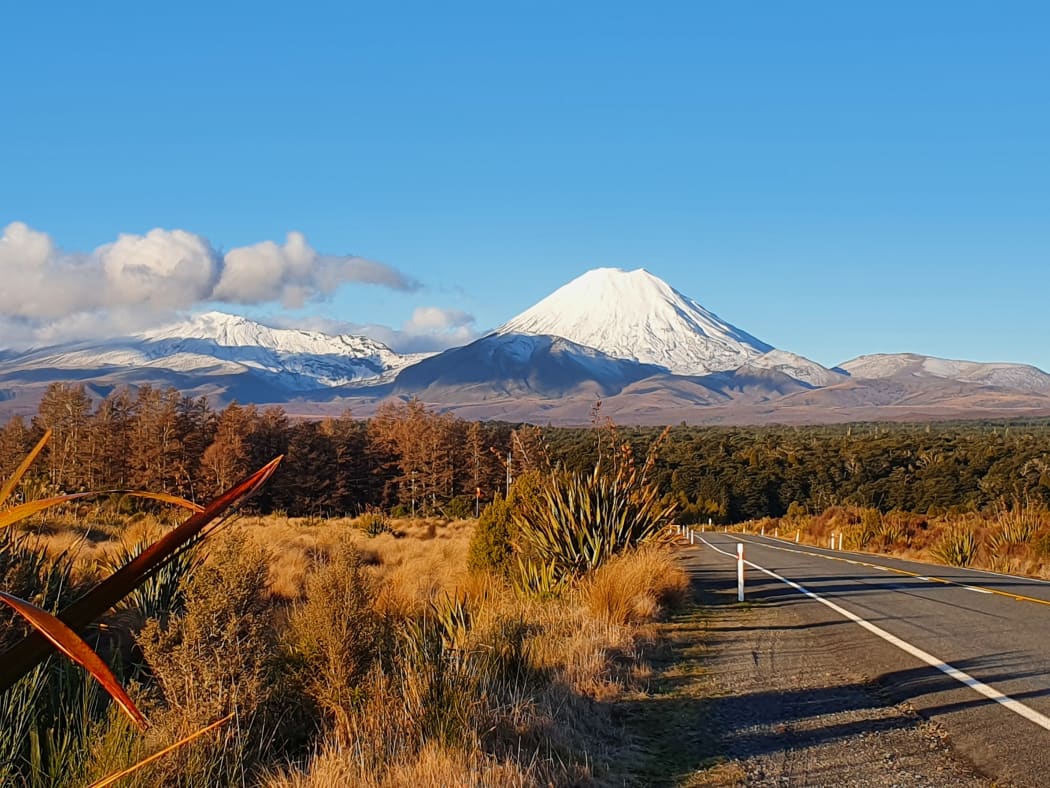
Photo: RNZ/Carol Stiles
The sap seems to be flowing a little earlier than normal in a Gisborne vineyard and sheep farmers in Central Otago are busy pre-lamb shearing but it's been hard keeping yards dry. On the Farm is a round up of conditions on farms and orchards around the country.
There's not been a heap of rain in the far north but, our contact says, enough to keep paddocks "un-nicely" wet. The soils there tend to be very soft so it's difficult to avoid pugging damage. Beef farmers are hunkering down ... doing as little possible to avoid the pugging. Dairy farmers are flat tack calving and milking.
By the end of the week, it was raining again around Pukekohe. Before then it was a mix of fine windless days and rain with brief gales. However the weekend was dry and a number of growers were busy planting potatoes before the incoming storm.
Waikato has had bouts of heavy rain and it's becoming mucky underfoot. Calves have been arriving in generally mild conditions. The region's magnolias are looking a picture.
After a mild period it's bleak and cold again in King Country. But soil temperatures of between 8 and 10 degrees mean the grass is still growing. Daffodils are out and early lambs are on the ground. An emerging issue is the very low water table. Our contact has analysed 36 years of rainfall and found the last three years in a row have been at the lowest range - 30 percent less than normal. He says unless they get an unusual amount of rain over the next few months, there will be problems. He's also concerned at the amount of carbon farming going in on relatively easy country in the region. He says it's tough to see land that would support a whole community of people turned over to growing trees to offset emissions.
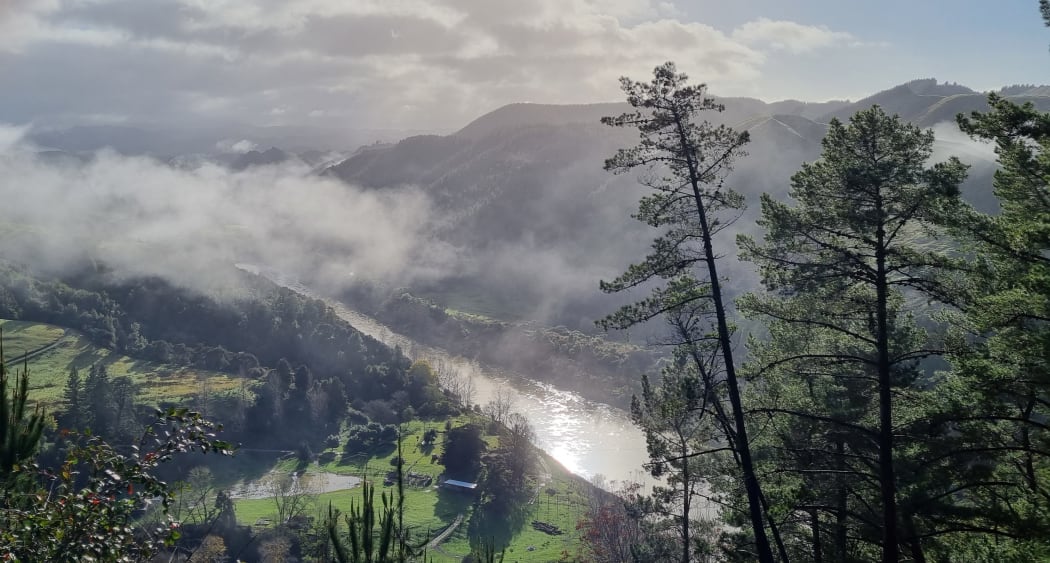
Whanganui River Photo: RNZ/Carol Stiles
A farmer in Bay of Plenty was just sitting down to breakfast when we called after a few hours work making sure all is well with his cows. He's just over halfway through calving with 10 to 15 a day arriving at the moment. The sun had come out after a very wet morning and after a couple of frustrating wet days. It's an intensive 10 to 12 weeks calving season and it doesn't stop after that. Relief staff are thin on the ground.
The big rain that was forecast for Taranaki fell at higher altitudes but there was very little lower down. Pasture covers are generally fine and there's a good supply of feed. The winter hasn't been quite as good as the impressive season last year but it's still been very acceptable. The occasional above average temperature makes it seem like spring is in the air. Calving's well over halfway on the lower farms. There's a thicker covering of snow on Mt Taranaki.
It's been mild and slightly wetter than usual in Gisborne. An organic winegrower says the sap seems to be flowing a little earlier than normal but that could all change in a cold southerly or late frost. After seeing the devastating effect of spring frosts in Europe, he's getting prepared in case the southern hemisphere takes its cue from the north as seems to happen. They find applications of compost and herbal teas help. Even miniscule amounts of kawakawa mixed with water and sprayed out the evening before can raise the temperature in the vineyard by a couple of points, although the winegrower admits this has not been scientifically proven. A lot of frost fans are going in round about for the increasing number of kiwifruit and apple orchards being developed.
There's lots of discussion among Hawke's Bay orchardists around how the plan to bring in more RSE workers will actually work on the ground. This week the government annnounced seasonal workers from Tonga, Samoa and Vanuatu will be allowed into the country without having to go into managed isolation from September. Our contact says the feeling in the region is that it's great news but of course the devil is in the detail. Pruning's going well with the number of hands available because of the relatively dry but chilly weather.
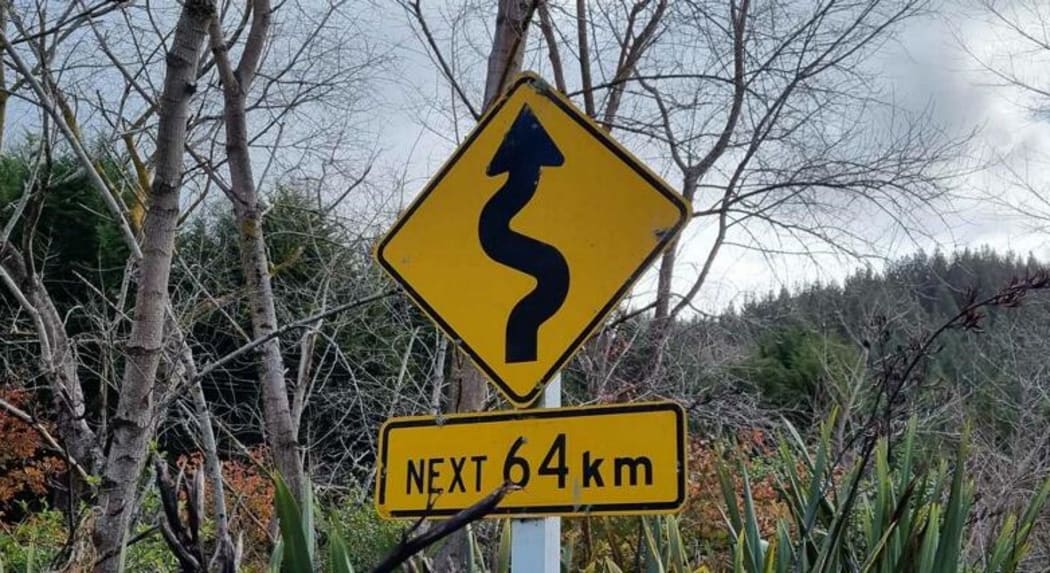
Photo: RNZ/Carol Stiles
Manawatu is having a peach of a late winter. The grass is growing more than you would expect for this time of year. It's dry but not too dry, so great for calving. The hill country farmers are still a month away from lambing.
We hear from Wairarapa that August is a cranky month to live with a farmer... they're trying to grapple with all sorts of things ... feeling perhaps they have too many sheep in an advanced state of pregnancy and not enough paddocks. They're working towards set stocking the ewes before lambing. It's cold and wet and getting muddy underfoot. It's said in this neck of the woods that you need three doses of snow on the Tararuas before you can be sure winter's really over and there's only been one dump so far. Dairy farmers are heads down calving at the moment.
An apple grower near Rabbit Island in Nelson says it's been a showery week but nothing compared to last week when he tipped 170 millimetres out of the rain gauge. The ground's sodden but flooding creeks and rivers have settled back. It's pretty much impossible to do machinery work or cultivation. In orchards and vineyards everyone's in pruning mode. Bud movement starts in early September so pears and early variety apple trees need to be pruned before then. Buds are already moving on plums, so copper sprays will need to be applied. Orchard managers are busy doing all the paperwork for export certifications for the coming season. Due to a lack of frosty weather, the local peony crop is at least week ahead of normal. The shoots on the popular Coral variety are already ten centimetres high .
A farm near Blenheim in Marlborough has recorded 320 millimetres of rain since June. The farmer says they had to catch up at some stage and now the grounds at 100 percent capacity. Any more rain just rolls off the hills and floods the creeks. There's also been track and slip damage across the province. Farmers are set stocking for lambing and calving, while trading cattle are behind hot wires on the hills but feed levels are reasonably tight. The wet weather's slowed down pruning in vineyards because of the risk of disease.
A farmer at Lake Brunner on the West Coast says it's been one of the wettest winters he can remember. For every one fine day there are several days of rain. With early calving underway he's pleased he has a wintering barn so the cows don't have to calve outside. Inside it's 6 degrees warmer. If the sun's out though they'll go out to stretch their legs and graze. The cows are eating bailage and getting a top-up of palm kernel. This winter he's had to buy in extra supplementary feed for the first time as he couldn't make enough bailage and silage earlier in the year, due to the wet and cold conditions. The bulk of the herd's due to start calving on midway through next week.
The rain just keeps on coming in Canterbury. It's been good to fill up soil profiles, creeks and dams, but a cropping farmer at Hororata says he's well past this point now and it's starting to hinder the early sowing of spring crops. Calving and lambing in this weather is not alot of fun either. The positives are farmers are well set up for a good spring.
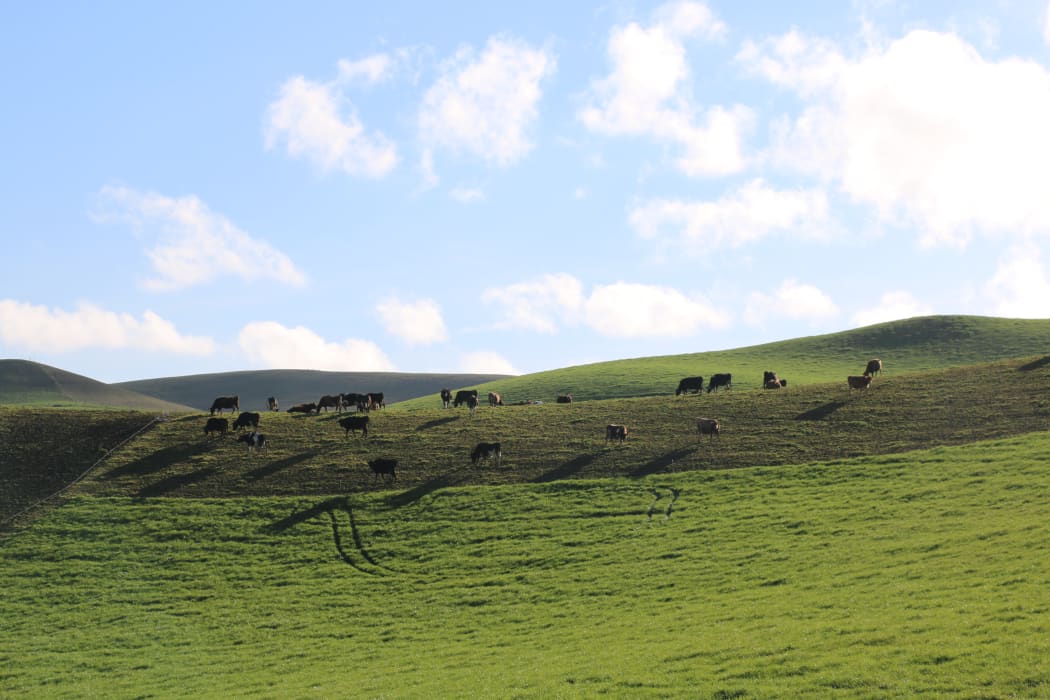
Otago Photo: RNZ / Cosmo Kentish-Barnes
Willows are turning red and the hills are green in Central Otago. Weather-wise it's been showery and frosty this week. Sheep farmers are busy pre-lamb shearing but it's been hard keeping yards dry so the wool doesn't get contaminated. Ewe scanning's going on as well and that muddies up the yards even more. The crossbred wool market continues to rise slowly but it's still miles from where it needs to be. There's no shortage of winter feed with stock getting a mixture of hay, bailage and silage. Calving's due to start soon in beef herds.
Our contact at Brydone in Southland says he already has 320 calves on the ground from a herd of five hundred cows - calving seems to be happening earlier for him than on some neighbouring properties. Conditions have been showery and cloudy, but certainly better than in July. Girls that have yet to calve are on silage and grass. Once calved it takes a couple of weeks before they get their appetites back so they're not producing heaps of milk yet. It's staff appreciation day today so the farmer we talked to is putting on a roast for his six team members.
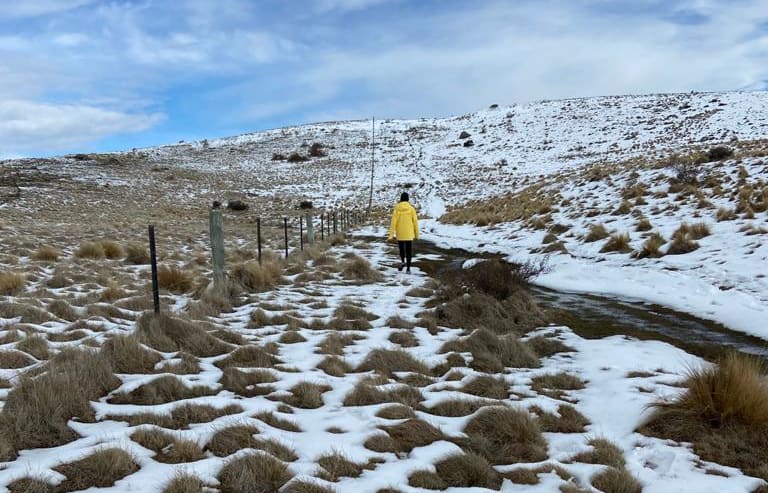
Photo: supplied

